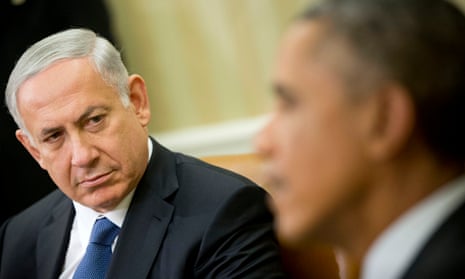Binyamin Netanyahu will address the joint houses of the US Congress tomorrow, but he will be boycotted by many Democrats – including the vice-president, Joe Biden.
Controversy over the visit, less than three weeks before Israeli elections, has centred on his incursions into US politics and their implications for one of the most successful bilateral relationships of modern times.
Susan Rice, Barack Obama’s national security adviser, has called Netanyahu’s acceptance of an invitation to address the Republican-dominated Congress on the administration’s continuing negotiations with Iran “destructive to the fabric” of US-Israeli relations. Her comment elicited furious reactions from hard-line Jewish groups. At the same time, many other American Jews–and many Israelis–have been squirming at Netanyahu’s abandonment of the universally accepted principle of keeping out of the internal politics of an ally.
The burden of Netanyahu’s message will be that the deal now in sight of the five permanent members of the UN security council plus Germany (the so-called P5+1), on the one hand, and Iran on the other is – as he has already put it – “dangerous for Israel, the region and the world”.
Whatever one thinks of Netanyahu, and whether or not his Washington gambit will win him votes, this is the crux of the matter: no Iran deal will work if it does not dispel for the foreseeable future the possibility of a nuclear-armed Islamic Republic. No deal can work if it gives Israel genuine cause to feel vulnerable.
Everything we know about the negotiations over the past 14 months suggests the deal being hammered out looks like being a good one for Israel. A comparison with the situation as recently as two years ago suggests that the current interim agreement signed by Iran and the powers in November 2013 – which Netanyahu denounced as a “historic mistake” – has been a good one too.
Back when Iran was governed by the gruesome Mahmoud Ahmadinejad, the country galloped ahead in its ability to produce enriched uranium and held its cooperation with the UN’s nuclear watchdog, the IAEA, at the bare minimum.
By the time Ahmadinejad stepped down, in 2013, Iran’s breakout time – the time it would take it to build a nuclear bomb – had come down to well under the one year the US has postulated as the minimum time necessary to compose a response. All the while, bilious rhetoric, proxy fighting (in Syria), dirty ops and escalating economic sanctions were the weapons of choice in what amounted to an undeclared war between Iran and the west.
Since then, the situation has improved greatly and measurably. As Antony Blinken, US deputy secretary of state, informed the Senate in January, Iran has diluted or converted all its 20% enriched uranium and suspended uranium enrichment above 5%, while the IAEA has “daily access to Iran’s enrichment facilities and a far deeper understanding of Iran’s nuclear programme”.
Iran is not only further away from the ability to build a nuclear bomb than it was, but a truce has interrupted the undeclared war. Ahmadinejad’s successor as president, the moderate Hassan Rouhani, barely mentions Israel, and no longer is there feverish talk of imminent Israeli or American strikes on Iran’s nuclear facilities. According to reports from recent talks , progress has been made on permitting Iran to retain face-saving numbers of centrifuges while ensuring that they work less efficiently (a combination designed to preserve a break-out time of at least a year).The lifetime of a putative deal could be as long as 15 years and encompass not only enrichment levels but also inspections of an unprecedented intrusiveness, as well as the reconfiguring of a controversial reactor so it cannot produce weapons-grade plutonium. Many details are yet to be nailed down, including a schedule for lifting sanctions that reassures the Iranians they will not be strung along, and it is by no means certain that agreement can be reached on all particulars by the end of June, when the (already twice-extended) interim agreement expires.
No deal can forestall definitively an attempt by Iran to make a bomb in the future, but a combination of restrictions, monitoring and economic and diplomatic incentives could make that extremely unlikely. A deal could remove the animus in Iranian-western relations since the 1979 Iranian revolution, and even defuse the Iranian-Israeli enmity. It seems remarkable that an Israeli prime minister should attempt to torpedo diplomacy that is making his country safer, and yet this is what Netanyahu will do when he has the ears of America and the world. He is unlikely to be judged kindly for doing so.
Christopher de Bellaigue is the author of Patriot of Persia: Muhammad Mossadegh and a Very British Coup
